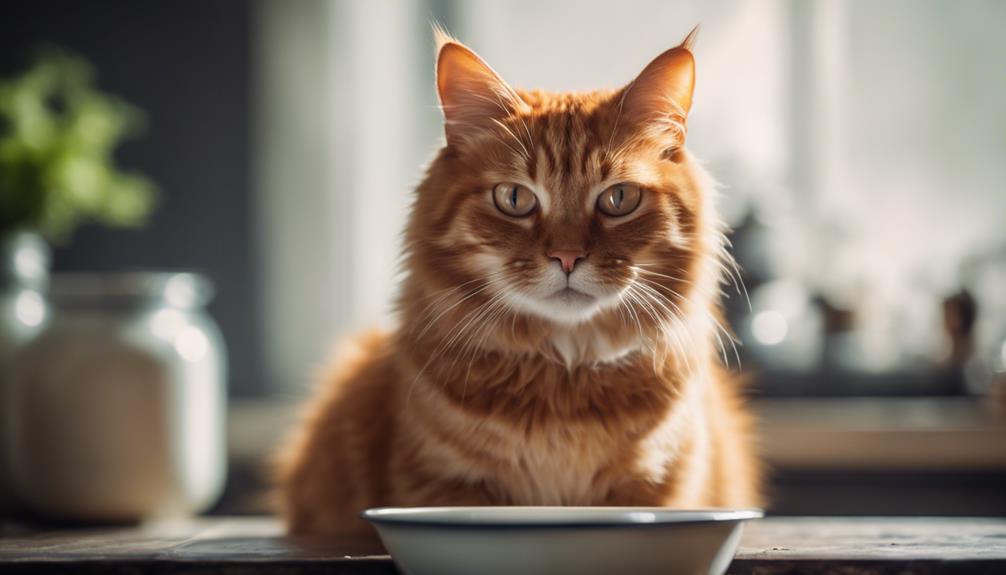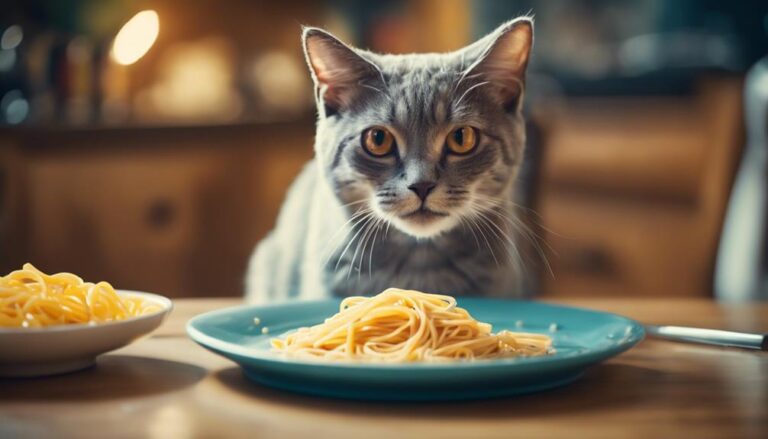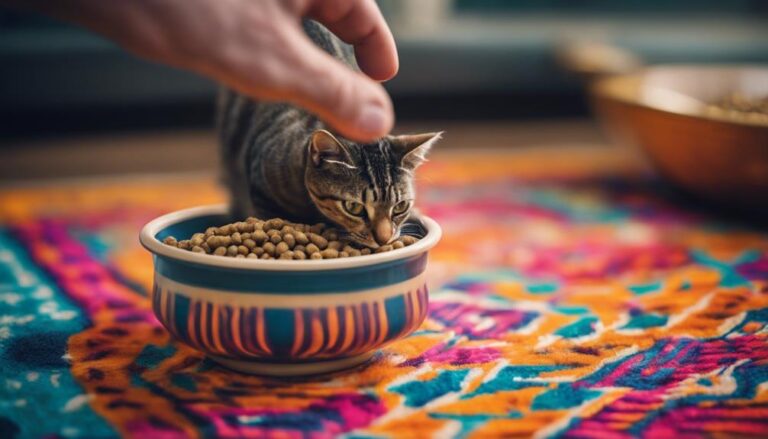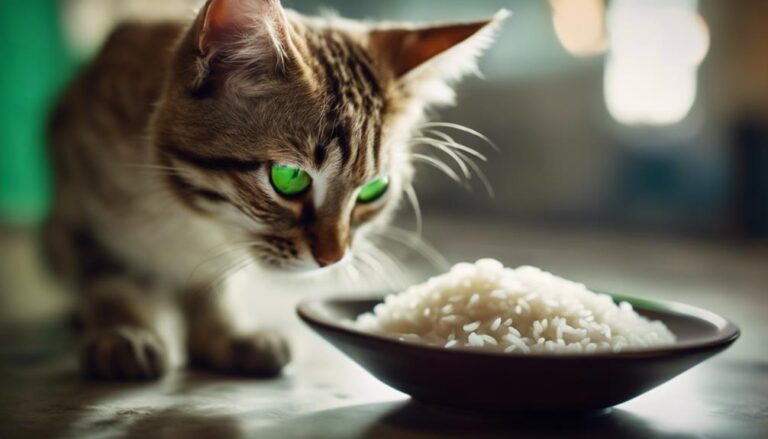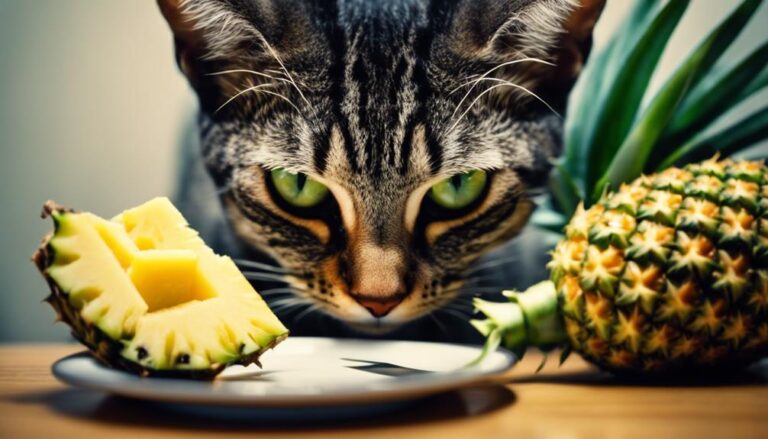If you've ever wondered about the role of rice in your feline friend's diet, the answer might surprise you. While cats can indeed consume rice, there are some crucial considerations to keep in mind before serving it to your pet. From the types of rice that are safe for cats to the potential benefits and risks associated with this grain, there's more to explore when it comes to understanding how rice fits into your cat's nutritional needs. So, are you ready to uncover the truth about cats and rice?
Nutritional Considerations for Cats and Rice
Wondering about the nutritional aspects of feeding rice to your cat? Cats can eat rice in small amounts, both brown and white varieties, as it's non-toxic to them. However, rice isn't a necessary component of a cat's diet and doesn't provide significant nutritional benefits. It's essential to ensure that any rice given to your cat is plain, well-cooked, and free from seasonings or additives. While rice can be a safe addition to your cat's meals in moderation, too much rice may lead to imbalances in their diet, potentially causing nutrient deficiencies.
Before including rice in your cat's diet, especially if they've specific health concerns or digestive issues, it's crucial to consult your vet. They can offer guidance on how to incorporate rice appropriately without compromising your cat's overall nutritional needs. Remember, a balanced diet tailored to your cat's individual requirements is key, and rice should only complement their primary food sources.
Types of Rice Suitable for Cats
If you're considering incorporating rice into your cat's diet, it's essential to know which types are suitable. Brown rice is a great choice for cats due to its high fiber and nutrient content, providing more health benefits than white rice.
While white rice lacks some essential nutrients, it can still be given to cats in small amounts. Both varieties should be thoroughly cooked and plain before offering them to your cat.
Remember, rice should only be an occasional treat in your cat's balanced diet. Consulting with a veterinarian before introducing rice to your cat is crucial to ensure it aligns with their specific nutritional needs.
Feeding Rice to Cats Safely
When feeding rice to your cat, remember to offer it as an occasional treat, not a staple food.
Ensure that the rice is thoroughly cooked and free from any seasonings that could be harmful to your pet.
Avoid feeding your cat raw rice to prevent potential ingestion of harmful substances like lectin.
Rice as Occasional Treat
Feeding rice to your cat as an occasional treat can be a safe choice when done in moderation and with proper precautions. When considering offering rice to your feline friend, keep these points in mind:
- Offer rice in small amounts as an occasional treat.
- Ensure the rice is thoroughly cooked and free from additives.
- Monitor your cat for any signs of discomfort after consuming rice.
- Remember that while rice can be a safe option when given sparingly, it shouldn't replace a balanced and nutritious diet for your cat.
Cooked Vs. Raw Rice
When considering whether to offer rice to your cat, it's essential to understand the differences between cooked and raw rice for their safety and well-being.
Cooked rice is safe for cats to consume in small amounts without seasonings, as it can help with digestive upsets. On the other hand, uncooked rice may contain harmful substances like lectin, which can be harmful to cats. Feeding raw rice to cats can lead to gastrointestinal issues as it's hard for them to digest.
It's crucial to monitor your cat for any signs of discomfort after consuming rice and consult a vet before incorporating it into their diet to ensure it's done safely and doesn't cause any harm.
Rice for Cats With Upset Stomachs
If your cat is experiencing digestive issues, incorporating rice into their diet can help soothe their upset stomach. Here are some important points to consider:
- Healthy and Balanced Diet: While rice can be beneficial for upset stomachs, remember that it isn't a complete and balanced diet for cats.
- Consult Vet: Before using rice as a remedy for your cat's digestive upsets, it's crucial to consult a vet to rule out any underlying health issues.
- Proper Nutrition: Transition your cat to a well-balanced and highly digestible cat food to ensure they receive proper nutrition.
- Rice Remedy: Rice can be a temporary solution for upset stomachs, but it shouldn't replace a nutritionally complete diet tailored to your cat's needs.
Rice as a Supplement for Cats
After addressing your cat's upset stomach with rice, considering using rice as a supplement to their diet can provide some additional benefits.
Rice can be given to cats in small amounts as a supplement since it's non-toxic to them. However, it's important to note that rice lacks essential nutrients that cats need to thrive, so it shouldn't replace their complete cat food.
If cats are given too much rice, they may not be getting all the necessary nutrients, potentially leading to deficiencies in their diet. Moreover, if cats consume excessive amounts of rice, they might lose interest in healthier food options that provide a balanced diet.
Therefore, while rice can be used as an occasional supplement or to aid with digestive issues, it shouldn't be a staple in a cat's diet due to its nutritional limitations. Remember to consult with your veterinarian before making any significant changes to your cat's diet.
Rice Vs. Other Cat-Friendly Grains
Comparing rice to other cat-friendly grains highlights the varying nutritional benefits for your feline companion.
- Brown rice: With its higher fiber content, brown rice is ideal for cats with digestive issues like diarrhea or constipation. It provides additional nutrients that can aid in maintaining your cat's digestive health.
- White rice: While white rice can be given to cats in limited quantities, it lacks some essential nutrients present in brown rice. Offering it sparingly can help prevent any nutritional deficiencies.
- Excessive carbohydrates: Rice, if consumed excessively, can lead to issues such as obesity or diabetes in cats. Monitoring the amount of rice in your cat's diet is crucial to prevent these health concerns.
- Cooked thoroughly: When preparing grains for your cat, ensure they're cooked thoroughly and free from harmful seasonings. This practice promotes optimal digestion and avoids any potential digestive disturbances for your feline friend.
Frequently Asked Questions
Is Cooked Rice Good for Cats?
Cooked rice is safe for cats in moderation. While not harmful, rice lacks vital nutrients for cats as obligate carnivores. It's best to consult your vet before adding rice to your cat's diet.
Can I Feed My Cat Chicken and Rice Everyday?
You should not feed your cat chicken and rice every day. While chicken is a good protein source, cats need a variety of nutrients. Rice lacks essential nutrients, and a diet solely of chicken and rice may lead to deficiencies.
Can I Give My Cat a Piece of Rice?
You can give your cat a small piece of cooked rice as an occasional treat. Ensure it's plain and well-cooked. Avoid uncooked rice. Watch for any discomfort after feeding. Remember, rice should not be a major part of their diet.
Are Cats Allergic to Rice?
Yes, cats can be allergic to rice, although it's uncommon. Watch for symptoms like vomiting, diarrhea, or skin problems. If you suspect an allergy, see a vet for diagnosis. Introduce new foods slowly to monitor reactions.

